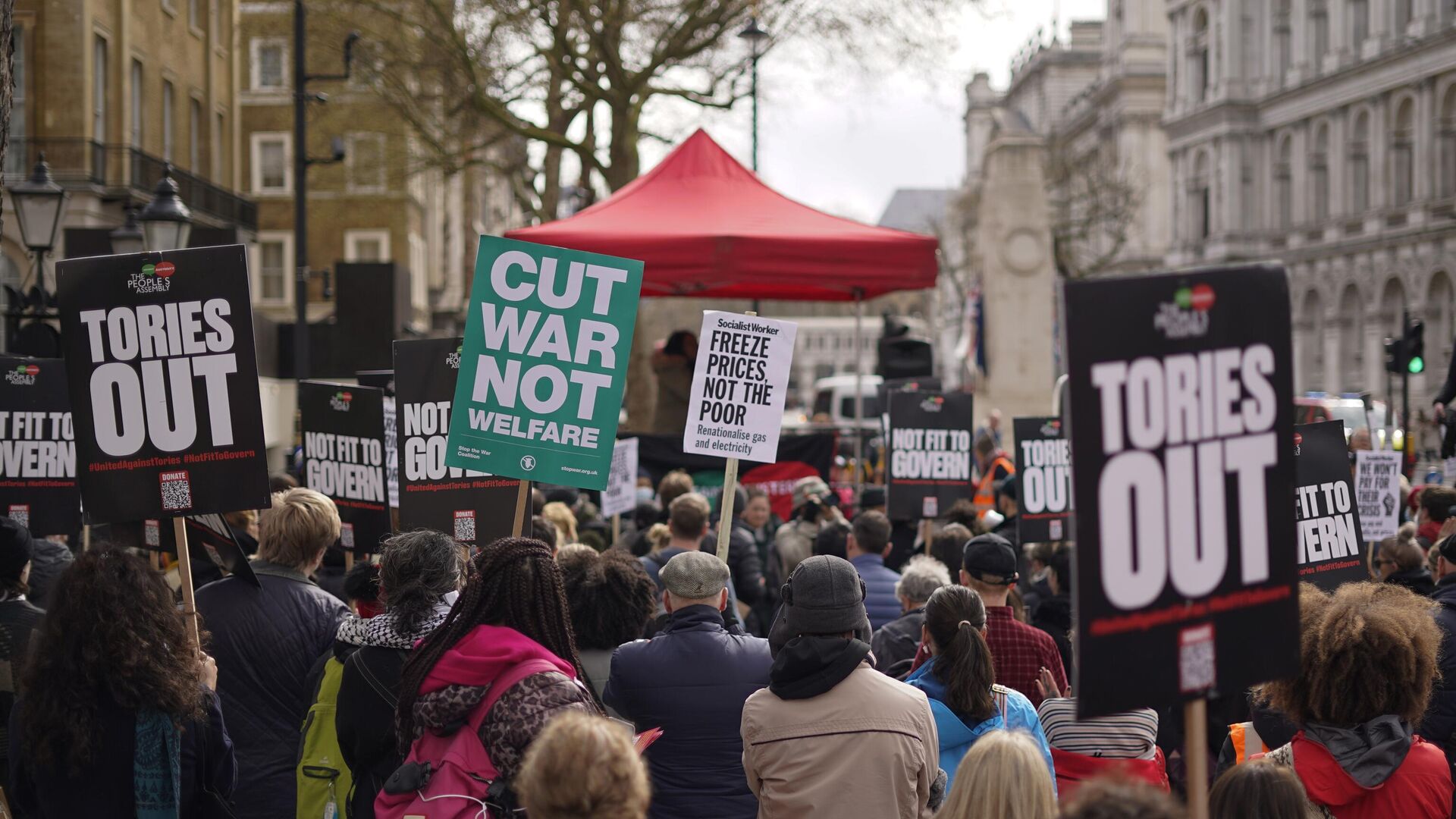Thousands March Through London Over Cost of Living Crisis - Videos
12:53 GMT 18.06.2022 (Updated: 15:19 GMT 28.05.2023)

© AP Photo / Alberto Pezzali
Subscribe
In May, the UK Office for National Statistics said that the annual inflation rate in the United Kingdom climbed to 9 percent in April from 7 percent a month earlier, hitting a 40-year-high.
Thousands of demonstrators on Saturday marched through central London to protest against how the UK Government has handled the cost-of-living crisis.
The protest was organised by the Trades Union Congress (TUC) with demonstrators marching from Portland Place to Parliament Square. The TUC said that workers have lost almost £20,000 ($24,450) since 2008 because pay has not kept pace with inflation.
Thousands of people chanted "We demand decent pay", as they held banners reading “End fuel poverty, Insulate homes now”, "Cut war not welfare", "Working people need more", "We demand better, enough is enough", and "Cost of Tories crisis", among others.
And...we are marching!#DemandBetter pic.twitter.com/jH4ZDy4Mkl
— Trades Union Congress (@The_TUC) June 18, 2022
Protest about the governments handling of the cost of living crisis underway in central Londonpic.twitter.com/cOLOMopLxa
— BNN 🇬🇧 Newsroom (@BNNUK) June 18, 2022
Trade union leaders, frontline workers and community organisations were among the demonstrators in London.
Great video from new rep Stacy Meek taking part in the TUC national protest march in London today after spending the week with us at conference a credit to the branch #TogetherWeRise #Unison pic.twitter.com/5BLP9wk5AV
— Unison Humberside Police Staff Branch (@UnisonHumbpol) June 18, 2022
Faced with a cost of living crisis under a corrupt Tory government, tens of thousands turning out in London to #DemandBetter ✊️ pic.twitter.com/Eh03YK8qcA
— Joe Karp-Sawey (@jkarpsawey) June 18, 2022
The growing cost of living crisis, driven by the soaring price of wholesale gas and electricity, was triggered originally by a post-pandemic surge in demand. It was then exacerbated by economic blowback from US, British and EU sanctions on Russia which have been hitting household budgets since the launch of Moscow's special military operation in Ukraine.
The British government has warned that Britons cannot expect pay rises to keep up with the soaring cost of living, as matching salaries to inflation risked causing prices in the shops to jump even higher. The Daily Telegraph has cited the UK's Chief Secretary of the Treasury Simon Clarke as saying that Britons should not have "unrealistic expectations around pay":
"We have to be very careful at this point about preventing inflation from becoming a self-fulfilling prophecy", Clarke said.
The warning came as more than 40,000 staff prepare for a three-day strike that is expected to cripple large swathes of the UK's train network. The RMT union said it was "unacceptable for railway workers either to lose their jobs or face another year of pay freeze" when inflation has broken a 40-year record. According to reports, teachers are also panning to take out a march to demand better pay and conditions. The Teachers' Union, the NASUWT, said their essential living expenses had surged ahead of wages, and the value of their salary nosedived by 19 percent over the past 12 years.
On 5 May, the Bank of England increased its key rate from 0.75 percent to 1 percent, the highest rate for 13 years. In early May, the Bank of England raised its forecast, predicting that inflation in the UK will reach an all-time high this year, exceeding 10 percent in the fourth quarter, as surging food and energy prices are compounded by sanctions against Russia.
The bank also decided to maintain the stock of UK government bond purchases, financed by the issue of central bank reserves, at £875Bln. The UK witnessed a 54 percent increase in energy prices in April, with a major increase in motor fuels, by 31.4 percent, which in turn, led to surging transport costs. In late May, E.ON UK, the largest supplier of energy and renewable electricity in Britain, warned that at least 40 percent of local households would live in fuel poverty this autumn if “very substantial” government intervention were not to take place.
In the meantime, the UK government has pledged to help more than eight million households, who will start receiving cost-of-living payments from 14 July.
"The first instalment of the £650 for qualifying low income households in England, Wales, Scotland and Northern Ireland will land in bank accounts from 14 July 2022, continuing to the end of the month. The move will see millions of households initially £326 better off as the government delivers significant interventions to support groups who are most vulnerable to rising costs. In total, millions of households will receive at least £1,200 from the government this year to help cover rising costs," the British government said.


